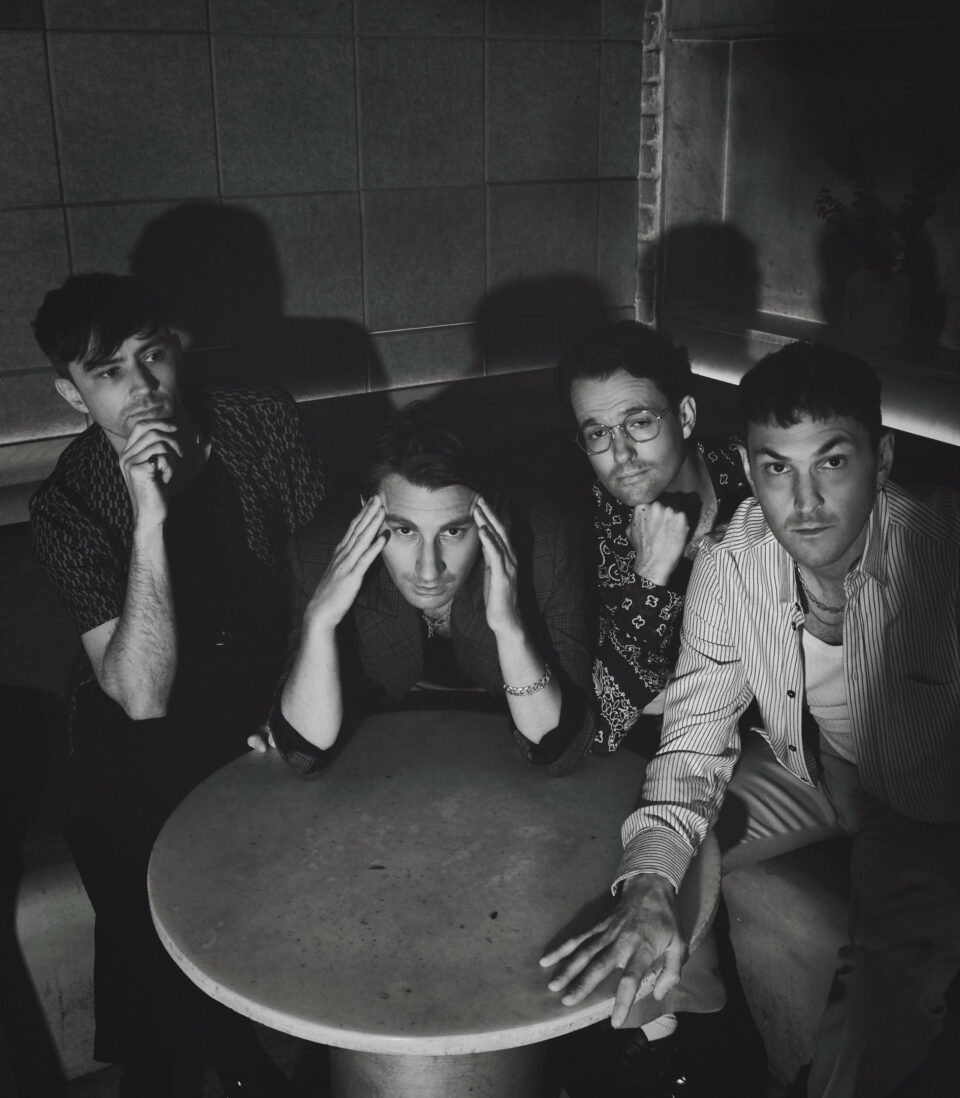Glass Animals will also be taking over FLOOD FM for our “Hacked” series airing at 10 a.m., 1 p.m., 5 p.m., and 10 p.m. PDT everyday from August 19 through 23 for a guest DJ takeover featuring hand-picked tunes and commentary. Mark your calendar and tune in here.
Masks and a toilet paper shortage dominated the cultural conversation when Glass Animals released the track “Heat Waves” to minimal fanfare in mid-2020. But as the months ticked on, the psychedelic toe-tapper caught fire on TikTok and embarked on a record-breaking 59-week climb to #1 on the Billboard Hot 100. At the time, the band’s frontman Dave Bayley couldn’t process its success. After all, he watched most of it unfold from his London flat during lockdown. “I felt like an observer in someone else’s life,” he tells me. “I didn’t feel connected to the biggest thing that’s happened to me in my career.”
That’s the frame of mind the band’s voice and sole songwriter found himself in when he sat down to write Glass Animals’ just-released fourth album, I Love You So F***ing Much. “The crux of this record is essentially, ‘What was that? Was that me? Is that an imposter version of me?’” Bayley recorded the album while he was locked away from the world (this time in the Hollywood Hills) as he was recovering, coincidentally, from a bout of COVID. “I didn’t sit down and think, ‘I’m going to write a record now.’ It was more just I was trapped in this house and was feeling fucking weird because COVID fucks with your head.” The forced isolation gave the American-born Brit a chance to finally reflect, ponder, and stare into the abyss. “I was properly doomed out,” Bayley says.
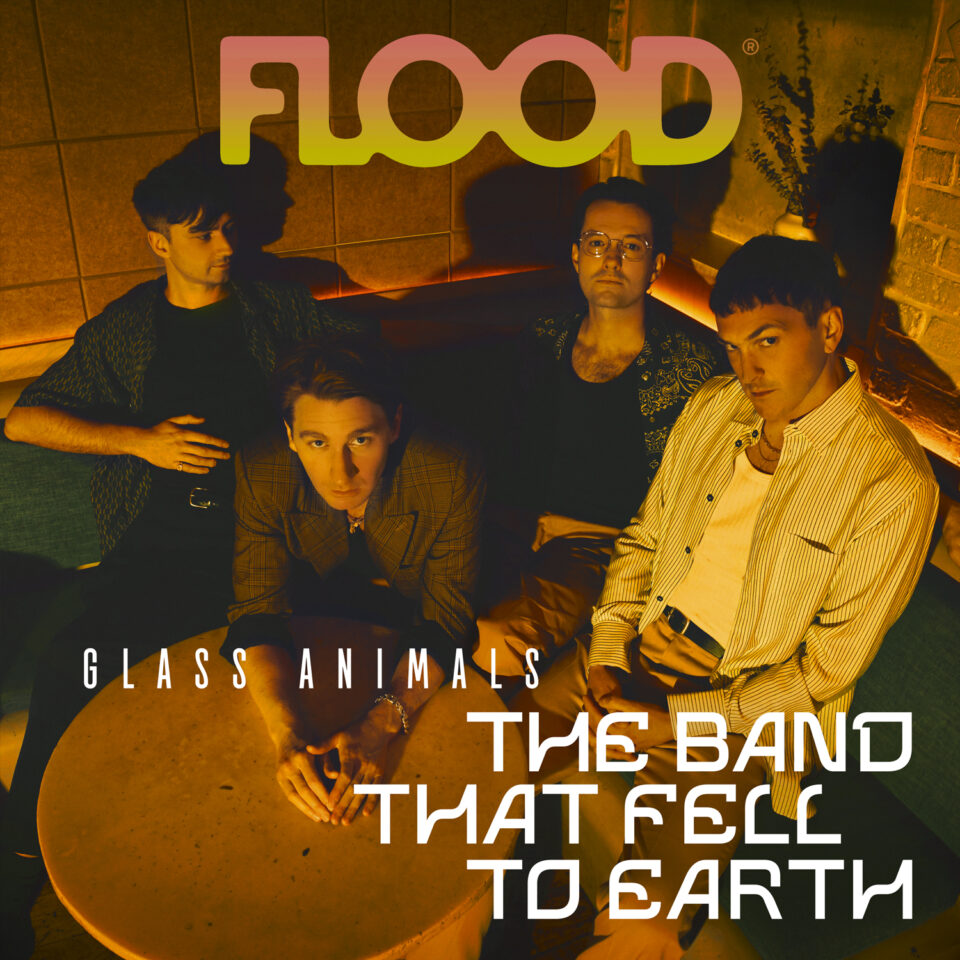
So he turned to music to pull himself out of the rut. “It always makes me feel a bit more grounded, makes me feel real.” It didn’t take long for the self-described loner to embrace the solitude and lose himself in the creative process. “It was the first time I’d gotten to make music on my own in years, because we were touring and then I was doing a lot of other people’s projects,” Bayley says, referring to his composition work for artists such as Florence + the Machine. Armed with just a guitar and a laptop full of samples, the demos started flowing—and a few even touched on the success of “Heat Waves.” “The song ‘whatthehellishappening?’ is partly about that: watching something happen, but having your hands tied and not being able to do anything about it.” But that’s just one layer. “It also relates to how the album ended up being written,” he says. “I was trapped in a house alone, and I found beauty in that.”
At the end of that week of isolation, Bayley had 50 songs—“some shit, some OK”—with a distinct theme: love. I Love You So F***ing Much is a concept album of sorts, a kaleidoscopic collage of love in all its facets. Bayley sets the tone with “Show Pony,” which examines how familial relationships lay the blueprint for everything that follows. “I think we all have a different picture of what human connection should look like, and it’s quite hard to shake sometimes,” he says. “One quirk of a relationship you had so long ago—one quirk of your aunt’s relationship with her husband—can affect you forever. It’s bonkers.”
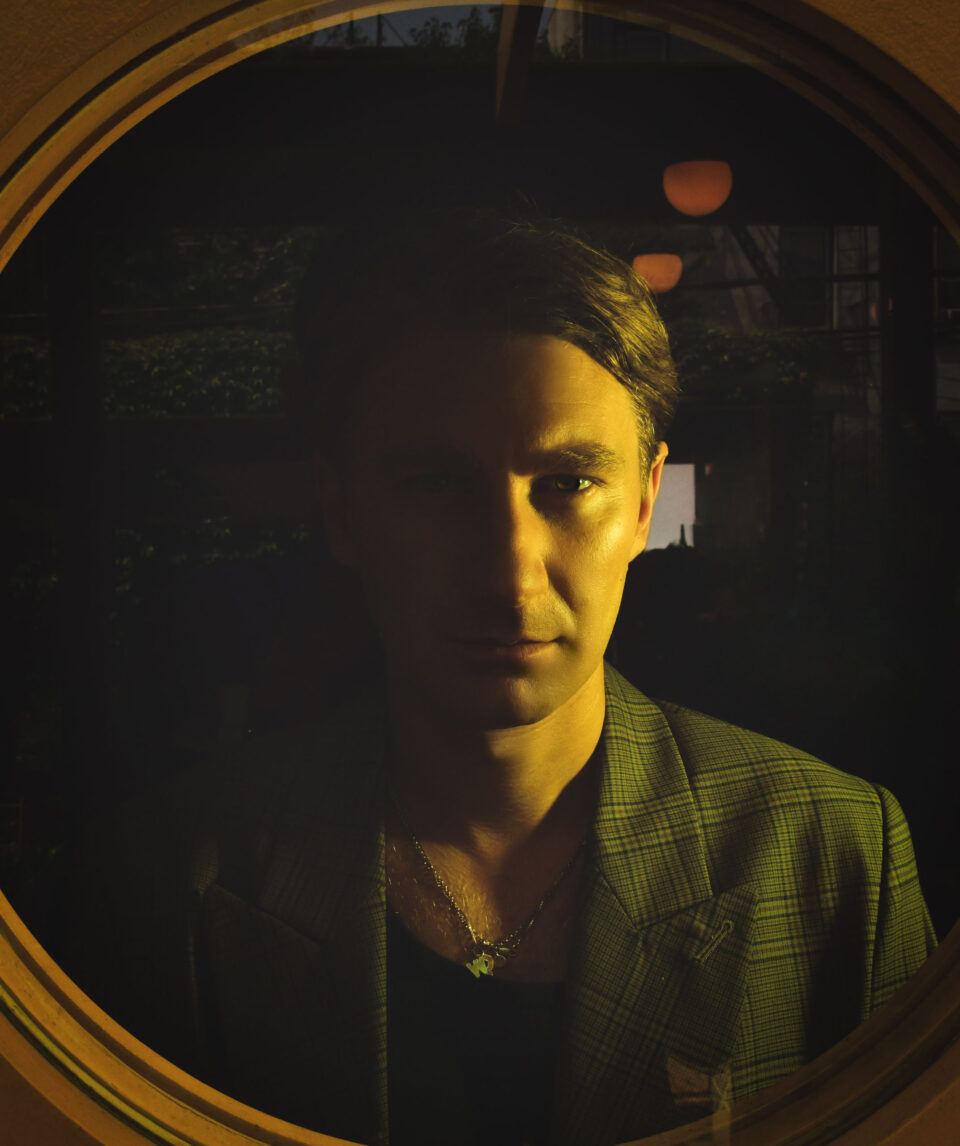
“I felt like an observer in someone else’s life. I didn’t feel connected to the biggest thing that’s happened to me in my career.”
He immediately selected “Show Pony” as the album opener because it provides context for everything that follows—namely, that our lives and relationships are the sum of a million tiny decisions and twists of fate. It also lays the groundwork for achingly vulnerable anthems like “Creatures in Heaven.” “That one is about how something someone said—or didn’t say—can make a path in your brain that you never get off of,” Bayley explains. Ever the observer, he doesn’t come to any particular conclusion. “I just think it’s good to acknowledge it.”
For an album preoccupied with matters of the heart, things take an unexpectedly cosmic turn as the singer, songwriter, and producer looks to the heavens for inspiration. “A Tear in Space (Airlock),” for example, finds the band in full space-rock mode. “I always wanted to do a space album,” Bayley says. “I’ve tried a few times, and it always sucks. It’s just really clinical and cold.” But those are the exact qualities he was looking for this time around. “Space is the opposite of the sentiment of the record,” he says. “It’s completely insatiable and will suck the breath out of your lungs and destroy you. I liked the juxtaposition.”
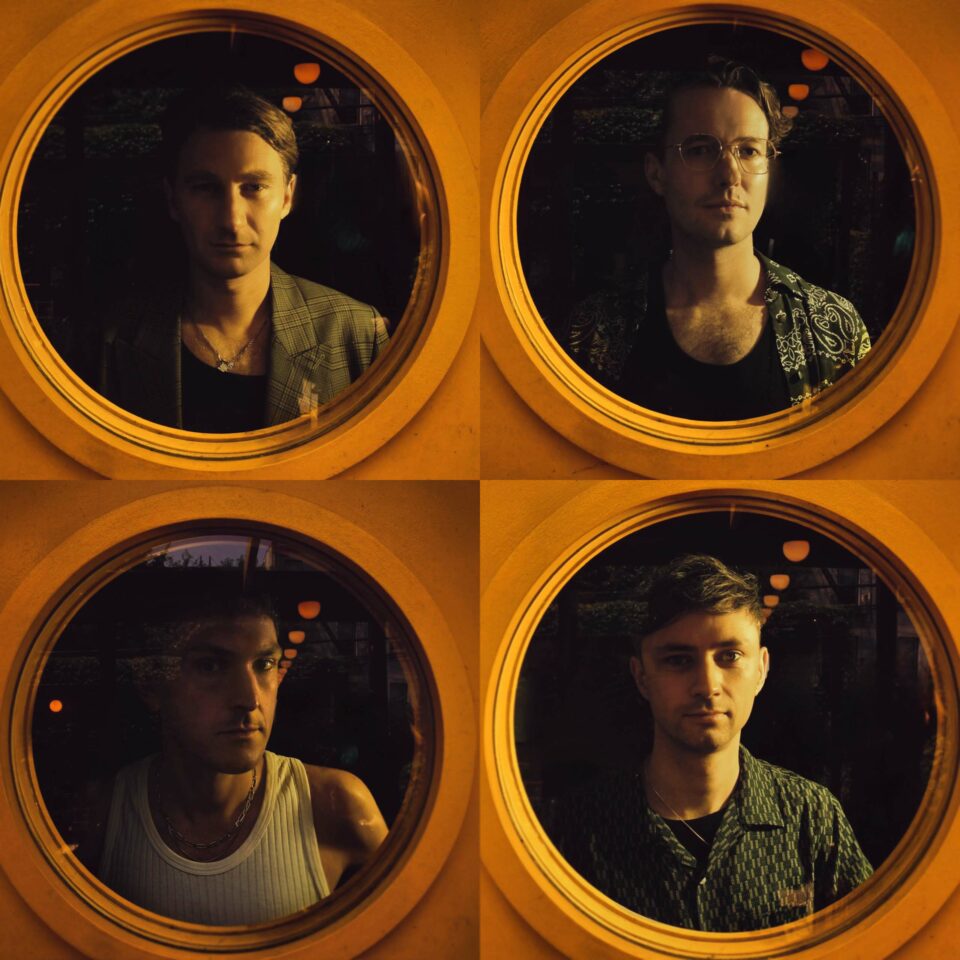
There’s also another way in which the cosmos influenced the record. “When I was in that house up in the Hills, I felt like I was in space looking down over all the little houses and people,” he says. “I realized those connections and relationships are so much bigger and more complex than all the stars. I wanted to tell a really intimate story that hopefully feels bigger than space.” For inspiration, he turned to the visual cues of movies while writing the album. “I have them on in the background and sometimes I try to fit the movie to the song—or fit the song to the movie.” When he gets stuck, he just unmutes the film and watches for a bit. “Sometimes it just gives you the lyric.” Among the reference points for I Love You So F***ing Much were Thelma & Louise, Bonnie & Clyde, and True Romance. “Yeah, I love movies,” Bayley adds.
“I wanted to tell a really intimate story that hopefully feels bigger than space.”
Naturally, science fiction also provided inspiration. He watched Arrival, Repo Man, and 2001: A Space Odyssey, and set about concocting his own soundtrack. “I was trying to make that sound of space, but in a really organic way,” Bayley says. His laptop provided a starting point. “I have a lot of samples on my computer of old analogue synthesizers,” he says. Next step was setting up a makeshift studio to drift deeper into the galaxy. “I bought loads of stuff that I’d been using the digital versions of, but also a few things that really just made for me the sound of those old space movies and soundtracks.” For a final flourish, he turned to the classics. “I bought some of the synths that Vangelis used on Blade Runner and some of the synths that the Radiophonic Workshop in the UK used to soundtrack a lot of the early Doctor Who radio shows.”
Bayley found himself charmed by 20th century ideas of the future. “I love weird old guitar pedals that were meant to sound like the future back in the ’60s,” he explains. “There was a real sense of hope—they thought we’d be colonizing Mars and living in harmony—and because we kind of failed, there’s a real charm and sadness to a lot of those instruments.” And sadness pervades the record, culminating in the devastating love song, “Lost in the Ocean.” “That’s my favorite one on the record,” Bayley says. “It’s the spaceship coming back down to Earth and landing in the ocean and realizing that even though life is fucking chaos and hurts sometimes, it’s going to be all right if you focus on the things that keep you grounded.” It’s advice that also applies to Bayley’s post–“Heat Waves” journey. “The song argues that if you keep doing the things that make you you, then you’ll be alright.”
As much as Bayley thrives at making music on his own, the project was ultimately a true collaboration with his bandmates. “I like spending time alone in the studio,” he says, “but I like spending time with my old friends, too—I’ve known my bandmates for over 20 years now.” When it came time to lay down the tracks with his long-time collaborators, the Glass Animals frontman kicked things off with a multimedia presentation. “I had spreadsheets and explanations,” he laughs. “There was a packet.” Among the information provided were song titles, general sonics, and film, art, TV, and literary references. “It’s a whole lot of shit that probably sounds completely deranged.”

However, there was a method to the madness. “I wanted the guys to understand what it’s meant to be,” he says, “but they’re perfectly welcome to say they hate it and then we’d probably move on to something else.” In fact, that’s an integral part of the band’s process. “There are so many songs that are undercooked or just not ready,” Bayley says. “That’s just how it goes.” But good ideas never die. “One day you can bring the song back up,” he says. “Sometimes I present them too early and playing them to someone else makes me realize, ‘Oh fuck, I’m going to leave that for a year and come back to it.’” There’s also material that simply gets canned, though as the years go by that’s less common. “I feel like I know when I have an idea that they’ll get on board with,” Bayley says. “But it’s still strange to be pitching an album because you never know.”
“Even though life is fucking chaos and hurts sometimes, it’s going to be all right if you focus on the things that keep you grounded.”
The hope is that his demo will be stretched and pulled in exciting new directions during the recording process. “Sometimes with a song you aim for A, and you end up with X,” he reveals. “And sometimes you just put the demo on the album because it has something that you can’t recreate.” It’s clear that Bayley thrives on defending his creative thesis and then embellishing it with the input of the band. “It’s a process, and it’s really exciting,” he says, “but sometimes you end up going in complete circles and driving yourself fucking mad and losing context.” This time around, however, everything fell into place and the record represents Bayley’s mental, emotional, and professional journey since “Heat Waves” jettisoned him into outer space.
Now that I Love You So F***ing Much is in the hands of fans, Bayley is enjoying the rollout. “It’s nice being able to interact with people in real life this time, because we didn’t get the chance to do that last album release because of the pandemic,” he says. “And then the time before that, I don’t think anyone listened. It’s new territory, and it’s wonderful.”
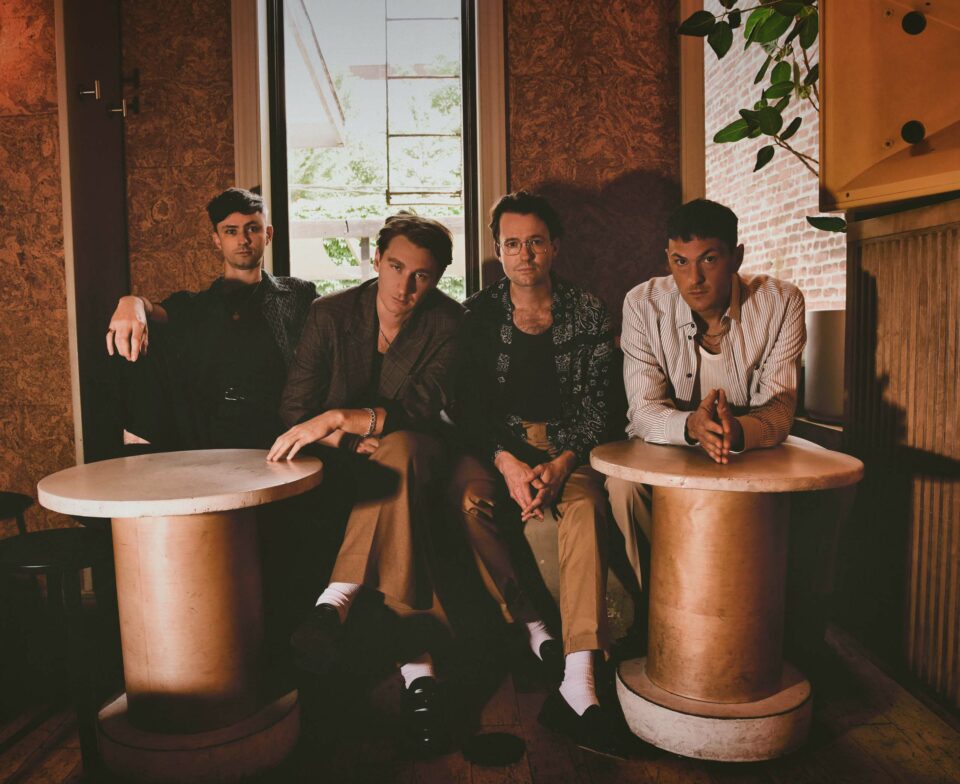
While Glass Animals has embarked on an exciting new chapter, the success of “Heat Waves”—three billion streams on Spotify alone and still climbing—and its parent album, Dreamland, looms large. “I’m pretty good at putting things to one side,” Bayley says. “That record did what it did, and it was absolutely wonderful, and it took us to places we never really thought we’d go and opened doors we never really thought would open.” He takes confidence in trusting the band’s long-standing process. “Dreamland came from just doing what we do. I spend some time alone writing songs, and then we get together and finish them.” The goal is always to make a record that they love instead of “trying to do something that tops what we did before.” In many ways, the studio serves as a cocoon. “As soon as I walk through the studio doors, I forget about that stuff and focus on the new shit,” he says.
“When we first started playing ‘Heat Waves’ at gigs, I was worried it would give people a flashback to lockdown and they’d be like, ‘Stop, no!’ But it was quite the opposite.”
Touring is the next step for Bayley, and the Glass Animals tour bus can’t leave the depot quickly enough. “I feel like I’ve heard [I Love You So F***ing Much] so many times—from writing to producing to recording to mixing to mastering—that I’ve slightly lost perspective,” he says. “But I think as soon as you stand on stage and hit the first chord, that perspective comes crashing back. I’m really excited for that moment.”
And Bayley isn’t afraid to revisit the eternally viral song that turned his life upside down. “When we first started playing ‘Heat Waves’ at gigs, I was worried it would give people a flashback to lockdown and they’d be like, ‘Stop, no!’ But it was quite the opposite.” He feels the same way. “It’s quite nice, like getting into a pair of old shoes. Maybe your feet got a little flatter and a little fatter, but they still fit and it’s nice getting back into them.” FL
